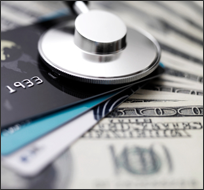
American public opinion is decidedly mixed regarding the Supreme Court’s decision to substantially uphold the Affordable Care Act (ACA) in June 2012. While supporters of the ACA hope it will reduce health care costs and provide affordable options for the uninsured, it will not be until 2014 that much of the ACA goes into effect. Survey data strongly suggest that health care coverage and costs remain areas of deep worry across the population.
A June 2012 report by the Kaiser Family Foundation, “Health Security Watch,” uses a nationally representative sample of 1,218 adults to gauge Americans’ “problems and concerns related to health care costs and access.” The report is based on a Kaiser Health Tracking Poll conducted in May 2012.
The survey’s findings include:
- Twenty-six percent of Americans report that they or a family member had “problems paying for medical bills in the past year.” Forty-seven percent of the uninsured report problems paying medical bills — more than twice the rate among those with insurance (23%).
- Fifty-eight percent of Americans report that high costs forced them to go without or delay medical treatment in the past year. The two most common responses to high costs are avoiding dental care and using home or over-the-counter remedies instead of visiting a health professional.
- Americans’ most common health care concerns are the rising cost of medical care and insurance, possibly losing health insurance, and the inability to afford prescription medications (at 64%, 41% and 40% respectively).
- Insured Americans are not immune from health care-related anxieties. Roughly half of those under 65 with health insurance report rising premiums, with 28% of those citing this as a financial strain. Additionally, those that have plans through their employers are less likely to report experiencing financial strain from health care costs than those that purchase individual plans.
- Trouble paying for health care varies according to income level. Thirty-nine percent of Americans with annual incomes less than $40,000 reported having trouble paying medical bills in the past year. Comparatively, 22% of Americans with annual incomes between $40,000 and $90,000 reported difficulty paying medical bills, while 13% of those earning $90,000 or more had difficulty with health care expenses.
- Seventy-two percent of low-income Americans “delayed or skipped care in the past year due to cost,” compared with 54% and 38% of middle and high income Americans, respectively.
- Forty-five percent of Americans in fair or poor health reported problems paying medical bills in the past 12 months, compared with 29% of those in good health and 19 percent in excellent health. Additionally, “77% of those in poor health say they have skipped or delayed care in one form or another.”
- Elderly people are less likely to report difficulty paying for medical care or skipping or delaying care to save money than those 18 to 64. While roughly equal proportions of men and women report problems in the past year paying medical costs, more women than men report that they postpone or skip care because of costs.
- “Similar shares of whites, blacks and Hispanics report having had problems paying for medical bills in the past year,” but more Hispanics than blacks or whites have reported delaying or skipping care in the past year due to cost (69%, 58% and 55%, respectively). Hispanics are also more likely to be very worried about rising health care costs than blacks or whites (46%, 25% and 31%, respectively).
A related 2011 study published in The American Journal of Medicine found that Massachusetts, which enacted a health care mandate for its population, had not seen lower levels of medical-related bankruptcies despite the reforms.
Tags: health care reform, medicine, poverty, African-American, Latino, Hispanic, Obamacare
